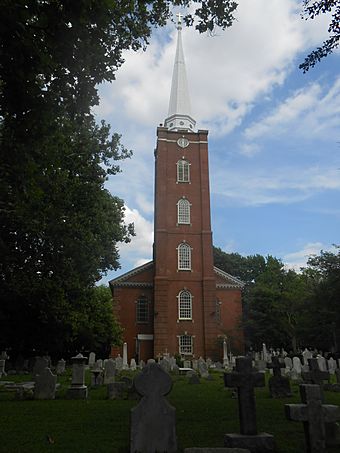St. Peter's Episcopal Church (Philadelphia) facts for kids
|
St. Peter's Church
|
|

St. Peter's Episcopal Church in Philadelphia, 2014
|
|
| Location | 3rd and Pine Streets, Philadelphia, Pennsylvania, U.S. |
|---|---|
| Built | 1758 |
| Architect | Robert Smith; William Strickland |
| Architectural style | Georgian |
| NRHP reference No. | 96000969 |
Quick facts for kids Significant dates |
|
| Added to NRHP | June 18, 1996 |
| Designated NHL | June 18, 1996 |
St. Peter's Church is a very old Episcopal church in Philadelphia, Pennsylvania. It first opened its doors on September 4, 1761. Many important people, including the Founding Fathers of the United States, worshipped here. This was especially true during the time of the Continental Congresses, when America was becoming a new nation. Because of its history, the building was named a National Historic Landmark in 1996. St. Peter's is still an active church today.
Building a New Church
By the mid-1750s, Philadelphia's main church, Christ Church, was getting too crowded. About 60 church members decided to build a new church. They formed a committee led by Colonel Jacob Duché Sr..
St. Peter's Church was started in 1758 in an area called Society Hill. The very first church service was held on September 4, 1761. The land for the church was given in 1757 by Thomas and Richard Penn. They were the sons of William Penn, who founded Pennsylvania. You can still see the Penn family's special symbol, called a coat of arms, above the church's pulpit.
The church was designed by a Scottish architect named Robert Smith. He also designed other famous buildings like Carpenters' Hall in Philadelphia and Nassau Hall at Princeton University. Building St. Peter's cost a lot of money, about £5,000, which was a huge amount back then! Much of this money was raised through a special lottery.
Church History and Design
St. Peter's and Christ Church were managed together until 1832. William White was the leader (rector) of both churches from 1779 until he passed away in 1836. He was also a chaplain for the U.S. Congress during the American Revolution. William White helped start the Episcopal Church in the United States in 1784. He became its first main bishop and the first bishop of Pennsylvania.
Most of St. Peter's Church looks much like it did in the 1700s. Robert Smith designed it in a style called "mid-Georgian auditory." This means it has classic, simple lines and clear glass windows. The design was meant to help people focus on the spoken word during services. The pulpit (where the sermon is given) and the lectern (where readings are done) are placed at the opposite end of the church from the altar. They stick out into the seating area. This was done to make sure everyone could hear and focus on the preacher.
The church still has its original high-backed box pews. These pews were like small, private boxes. They were designed to keep people warm in the winter. George and Martha Washington, who were very important figures in early American history, often sat in Mayor Samuel Powel's box. Many churches removed their box pews when central heating became common. However, St. Peter's kept its original pews because services are held at both ends of the church.
In the past, enslaved people and servants of church members sat on hard benches at the west end of the gallery. One of these enslaved people, Absalom Jones, became a respected leader in Philadelphia's free Black community. He worked with Richard Allen to create the Free African Society. This group helped African Americans in Philadelphia. Later, Absalom Jones started the first African-American Episcopal Church, called the African Episcopal Church of St. Thomas, in 1794. He became the first Black Episcopal priest in 1804.
The church's tall tower and steeple were added in 1842. They were designed by a famous Philadelphia architect named William Strickland. The tower holds a set of eight bells. These bells were given by Benjamin Chew Wilcocks and were made in London at the Whitechapel Bell Foundry. This is the same place that made the famous Liberty Bell!
Important People Buried Here
Many notable people are buried in the churchyard of St. Peter's. Here are a few:
- Nicholas Biddle (1786–1844), a very important banker who led the Second Bank of the United States.
- George M. Dallas (1792–1864), who was the 11th Vice President of the United States.
- Stephen Decatur (1779–1820), a brave American naval officer.
- Reverend Jacob Duché (1737–1798), the first chaplain for the Continental Congress.
- John Nixon (1733–1808), who was the first person to publicly read the Declaration of Independence in Philadelphia.
- Charles Willson Peale (1741–1827), a famous American painter and scientist.
- Eliza Lucas Pinckney (1722–1793), a plantation owner who helped develop indigo as an important crop.
- Chiefs from eight different American Indian tribes. They died from Yellow fever in 1793 while visiting Philadelphia to meet with President George Washington.
See also
 | Jewel Prestage |
 | Ella Baker |
 | Fannie Lou Hamer |




